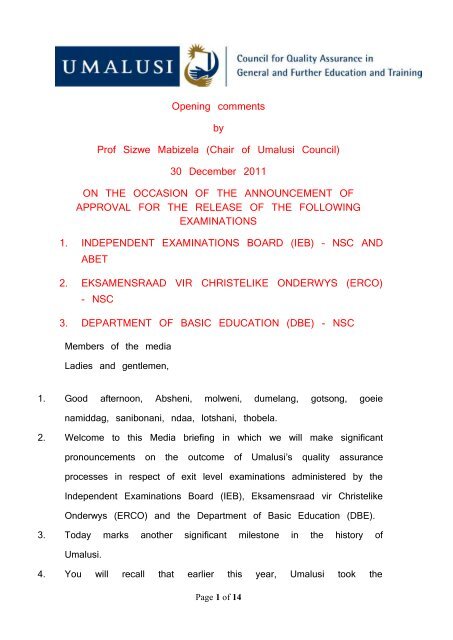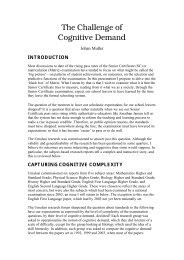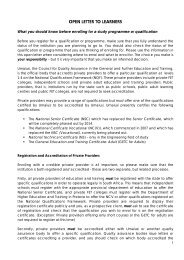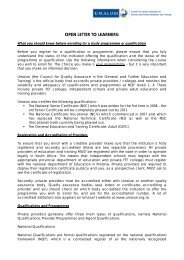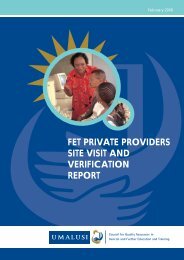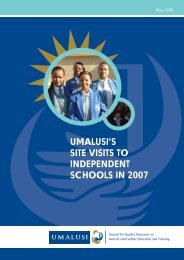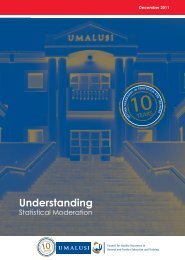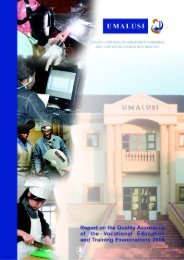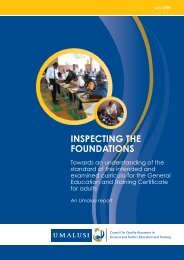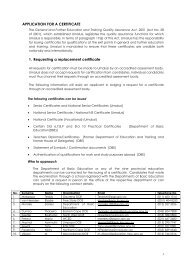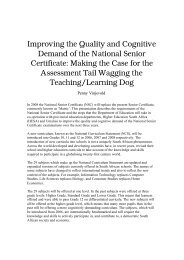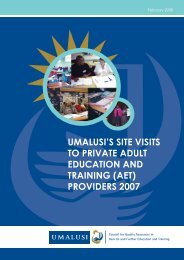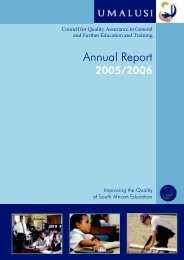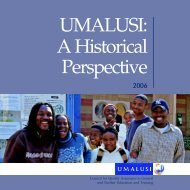Media Briefing Statement - Umalusi
Media Briefing Statement - Umalusi
Media Briefing Statement - Umalusi
Create successful ePaper yourself
Turn your PDF publications into a flip-book with our unique Google optimized e-Paper software.
Opening commentsbyProf Sizwe Mabizela (Chair of <strong>Umalusi</strong> Council)30 December 2011ON THE OCCASION OF THE ANNOUNCEMENT OFAPPROVAL FOR THE RELEASE OF THE FOLLOWINGEXAMINATIONS1. INDEPENDENT EXAMINATIONS BOARD (IEB) – NSC ANDABET2. EKSAMENSRAAD VIR CHRISTELIKE ONDERWYS (ERCO)- NSC3. DEPARTMENT OF BASIC EDUCATION (DBE) - NSCMembers of the mediaLadies and gentlemen,1. Good afternoon, Absheni, molweni, dumelang, gotsong, goeienamiddag, sanibonani, ndaa, lotshani, thobela.2. Welcome to this <strong>Media</strong> briefing in which we will make significantpronouncements on the outcome of <strong>Umalusi</strong>’s quality assuranceprocesses in respect of exit level examinations administered by theIndependent Examinations Board (IEB), Eksamensraad vir ChristelikeOnderwys (ERCO) and the Department of Basic Education (DBE).3. Today marks another significant milestone in the history of<strong>Umalusi</strong>.4. You will recall that earlier this year, <strong>Umalusi</strong> took thePage 1 of 14
unprecedented step of releasing the National Senior Certificatestandardisation decisions. This action was necessitated by theheightened level of national interest in the work of <strong>Umalusi</strong> inquality assuring the results of the National Senior Certificate.5. That public disclosure was important in ensuring that the generalpublic had some insights into why <strong>Umalusi</strong> moderates learnerperformance and how that it does it.6. Earlier this year, <strong>Umalusi</strong> Council took a decision that allstandardisation decisions in respect of qualifications it qualityassures will in future be made public.7. This decision was not taken lightly, given that the internationalnorm, standard and practice is to keep the raw mark moderationdecisions confidential to protect the interests of candidatesinvolved.8. Before proceeding any further, allow me to explain <strong>Umalusi</strong>’smandate.9. <strong>Umalusi</strong> is the Quality Council responsible for quality assurance inGeneral and Further Education and Training. It is the accountableand certificating authority for assuring the quality of the followingqualifications:The National Senior Certificate (NSC), which replaced theSenior Certificate; and General Education and Training Certificate (ABET level 4);the National Certificate Vocational NC(V); andthe NATED N courses.10. In addition to assuring the quality of the examinations administeredby the Department of Basic Education and the Department ofPage 2 of 14
Higher Education and Training, <strong>Umalusi</strong> is also responsible for thequality assurance the examinations administered by twoindependent assessment bodies:The Independent Examinations Board (IEB); andThe Eksamensraad vir Christelike Onderwys (ERCO).11. Section 17 of the GENFETQA Act of 2001 (as amended in 2008)stipulates, inter alia, that:(1) The Council must assure the quality of assessment atexit points;(2) The Council must, with the concurrence of the Director-General andafter consultation with the relevantassessment body or education institution, approve thepublication of the results of learners if the Council issatisfied that the assessment body or education institutionhas—(i)conducted the assessment free from any irregularitythat may jeopardise the integrity of the assessmentor its outcomes;(ii)complied with the requirements prescribed by theCouncil for conducting assessments;(iii)applied the standards prescribed by the Councilwhich a learner is required to comply with in orderto obtain a certificate; and complied with everyother condition determined by the Council.Page 3 of 14
(3) The Council must issue certificates to learners who haveachieved qualifications or part qualifications.12. From the above, it is clear that <strong>Umalusi</strong> is required to approvethe release of results once it is satisfied that the examinationshave been conducted in a fair, valid and credible manner.13. In order to make this determination, there are various qualityassurance processes that must be carried out. These are:(1) Moderation and approval of question papers;(2) Verification of the moderation of internal assessments;(3) Monitoring of the conduct of examinations;(4) Monitoring of the marking process;(5) Verification of marking;(6) Standardisation of the results.14. As <strong>Umalusi</strong>, we would like to maintain the standard of theexamination in all the subjects so that we would measure thereal gains in quality of teaching and learning rather than falsegains through examination papers of dubious quality.15. Over the past few days, commencing on the 15 th December 2011,<strong>Umalusi</strong>’s Assessment Standards Committee has been hard atwork standardising the examination results of the qualificationsmentioned above.16. <strong>Umalusi</strong> conducts not only the process of standardisation, which isrequired for national examinations, but it also, through rigorousPage 4 of 14
procedures, assures the quality of the entire examinationprocesses.17. Gaining the approval of <strong>Umalusi</strong> Council for the release of theresults is determined by the examinations’ level of compliance withpolicies, directives and guidelines issued by both <strong>Umalusi</strong> and theDepartment of Basic Education.18. Before such an approval is granted, <strong>Umalusi</strong> Council has tosatisfy itself that no significant irregularities have occurred toundermine the integrity and the credibility of the examinationprocesses.The Standardisation process:19. Let me briefly outline what the standardisation process is.20. Any large-scale examination process invariably has many andvaried sources of variability.21. Most of these are unplanned, unintended, and undesirable. Theyvary from mistakes in a question paper to subtle issues of levelof difficulty of a question paper and of possible multiple and validinterpretations of questions.22. It is universally accepted that judging the level of difficulty of aquestion paper is a near impossible exercise. It is only after thepaper has been written and marked that one is able to determinewhether it was pitched at the correct level or not.23. Standardisation of learner performance is an important qualityassurance process used the world-over to mitigate the impact onPage 5 of 14
learner performance caused by factors other than the learners’subject knowledge, abilities and aptitude.24. There are therefore two main objectives for standardisation:23.1. First, to ensure that a cohort of learners is not advantagedor disadvantaged by factors other than their knowledge ofthe subject, abilities and their aptitude;23.2. Second, to achieve comparability and consistency of learnerperformance across the years.25. In short, standardisation seeks to mitigate fluctuations in learnerperformance that are a result of factors within the examinationprocesses themselves rather than the knowledge, aptitude orabilities of learners.26. <strong>Umalusi</strong>’s standardisation is done by the Assessment StandardsCommittee. This is a committee of Council which comprises menand women of impeccable credentials, personal integrity andcredibility.27. They are independent professionals who are not in the employ of<strong>Umalusi</strong>. They are appointed by <strong>Umalusi</strong> Council based on theirextensive knowledge of, experience and expertise in statisticalmoderation, statistics, assessment, curriculum, and educationalmatters.28. Some of them are affiliated with our universities and others serveon national and international bodies that deal with education andassessments.29. Most of them have been doing this work for many years andPage 6 of 14
have seen this process mature over time.30. With your indulgence, I wish to publicly acknowledge and extendour sincere gratitude to the members of the AssessmentStandards Committee. They are Prof Dan Kgwadi of North West University – Chairperson ofthe Committee Prof Paul Fatti (Professor emeritus, Wits University) Prof Moon Moodley (Professor emeritus, University of KwaZulu-Natal) Prof Sarah Howie, Professor at University of Pretoria; Prof John Aitchson, University of KwaZulu-Natal Prof Tim Dunne, University of Cape Town; Dr Nic Taylor, Research Fellow at JET; Mr Brian Shreuder, DoE, Western Cape; Dr Jeanne Gamble, University of Cape Town.31. I also wish to express deep appreciation to Ms Fatima Dada, amember of <strong>Umalusi</strong> Council ExCo, who participated in this year’sstandardisation processes.32. The standardisation decisions are informed by qualitative reportswhich include marking and moderation reports and the postexamination analysis reports which provide comparative analyses ofquestion papers over a period of three years.33. Subjects are standardised individually, in a linear and non-iterativePage 7 of 14
manner.Principles of Standardisation34. There are eight principles that guide the standardisation process. Iwill mention only two of these as they are particularly important.(1) In general no adjustment should exceed 10% of thetotal mark of the paper or the historical average.(2) In the case of the individual candidate, the adjustmenteffected should not exceed 50% of the raw markobtained by the candidate. Put simply, this means thatmoderation of raw marks of individual candidates shouldnot lead to the doubling or halving of a candidate.35. It should be obvious from (1) and (2) above that one cannothave a fixed level of adjustment – an appropriate scalingoperation must be employed in order to be consistent withthese principles of standardisation.36. In instances where raw examination marks are accepted, it isbecause(1) First, the examination has been adjudged to be ofappropriate level;(2) Second, the learner performance is in line with the averagehistorical learner performance profile in the subject;(3) Third, the conduct and management of the examination inthe subject were not compromised.37. For the standardisation of the National Senior Certificate rawPage 8 of 14
marks, we use the ogive (or cumulative frequency) curves torepresent the cumulative frequency of learner marks. Inconstructing the ogive curve, we use the ‘less than or equal to’criterion.38. Let us now turn to the results of the 2011 examinations:1. Examinations administered by IEB1.1 National Senior CertificateIn total, 8 281 candidates sat for the National SeniorCertificate examinations administered by the IndependentExaminations Board.A total of 58 subjects were presented for standardisation.After moderation, raw marks were accepted for 45 thesubjects. This figure represents 78% of the subjects.Moderation with minor upward shifts towards the averagehistorical learner performance profile was effected in 5subjects. This represents 9% of the subjects.Moderation with minor downward shifts towards the averagehistorical learner performance profile, was made for 10subjects. This represents 13% of the subjects.For detailed standardisation decisions, refer to slides.Final declaration and release of results:Having studied all the evidence at hand on the management andconduct of the examinations administered by the IEB, <strong>Umalusi</strong> isPage 9 of 14
satisfied that nothing has compromised the integrity or credibilityof the examinations process. We therefore conclude that theexaminations were fair, valid and credible. We commend IEB forrunning a successful and credible examinations process.Accordingly, we hereby approve the release of the results of theNational Senior Certificate Examinations administered by theIndependent Examinations Board on a date to be determined byIEB.1.2 General Education and Training Certificate – (ABET)In total, approximately 1 070 candidates sat for the GETCABET examinations.Eight (8) learning areas were presented for standardisation.Following moderation, raw examination marks were acceptedfor all eight (8) learning areas.For detailed standardisation decisions, refer to the power-pointslides.Final declaration and release of results:Having studied all the evidence at hand on the management andconduct of the examinations administered by the IEB, <strong>Umalusi</strong> issatisfied that nothing has compromised the integrity or credibility ofthe examination process. We therefore conclude that theexaminations were fair, valid and credible. We commend IEB forrunning a successful and credible examinations process. Accordingly,we hereby approve the release of the results of the ABETPage 10 of 14
Examinations administered by the Independent Examinations Board ona date to be determined by IEB.2. Examinations administered by the Eksamensraad vir ChristelikeOnderwysIn total, 1 273 candidates sat for the National SeniorCertificate examinations administered by ERCO.A total of 21 subjects were presented for standardisation.After moderation, raw examination marks were accepted for18 the subjects. This figure represents 86% of thesubjects.Moderation with minor upward shifts towards the averagehistorical learner performance profile was effected in 3subjects. This represents 14% of the subjects.No downward adjustments were made.For detailed standardisation decisions refer to slidesFinal Declaration and release of results:<strong>Umalusi</strong> has the responsibility to safeguard the quality, standard,integrity and credibility of the National Senior Certificate. In doingso, we must ensure that learners are not unduly advantaged ordisadvantaged by factors related to the conduct and managementof the examination processes.<strong>Umalusi</strong> has serious concerns about the Eksamensraad virChristelike Onderwys’ (ERCO’s) ability and capacity to run aPage 11 of 14
successful examination process. These concerns range from theirability to set question papers of appropriate standard to the actualmanagement and conduct of the examinations process. Amongother things, <strong>Umalusi</strong> has taken the decision not to accept thesite-based assessment (SBA) marks of all ERCO candidates. Tomitigate the adverse impact on learner performance, learner resultswill be computed without the SBA component.In order to ensure a credible examination, <strong>Umalusi</strong> initiated anumber of interventions in the period leading to and duringERCO’s 2011 examinations. <strong>Umalusi</strong> also notes that ERCO useda substantial number of examination papers (39 papers in total)set by the Department of Basic Education and approved by<strong>Umalusi</strong>.Notwithstanding the concerns raised above, <strong>Umalusi</strong> declares thatthe moderated marks are a fair reflection of learner performancein the examinations administered by ERCO. Accordingly, we herebyapprove the release of the results of the National SeniorCertificate Examinations administered by the Eksamensraad virChristelike Onderwys on a date determined by ERCO.3. Examinations administered by the Department of Basic EducationIn total, 620 266 (512 029 full time and 108 237 part time)candidates sat for the National Senior Certificate examinationsadministered by the Department of Basic Education.A total of 56 subjects were presented for standardisation.After moderation, raw marks were accepted for 45 thePage 12 of 14
subjects. This figure represents 80% of the subjects.Moderation with minor upward shifts towards the averagehistorical learner performance profile was effected in 3subjects. This represents 5% of the subjects.Moderation with minor downward shifts towards the averagehistorical learner performance profile, was made for 8subjects. This represents 15% of the subjects.For detailed standardisation decisions, refer to slides.Final Declaration and release of results:Having studied all the evidence at hand on the management andconduct of the examinations administered by the Department ofBasic Education, <strong>Umalusi</strong> is satisfied that nothing has compromisedthe integrity or credibility of the examinations process. Wetherefore conclude that the examinations were fair, valid andcredible. We commend DBE for running a successful and credibleexaminations process. Accordingly, we hereby approve the releaseof the results of the National Senior Certificate Examinationsadministered by the Department of Basic Education.Conclusion39. <strong>Umalusi</strong> Council is pleased that the system is stabilising well andhas reached a significant level of maturity as evidenced by thehigh percentage of subjects whose raw marks were accepted afterthe moderation process.40. It is also worth noting that in the few instances where moderationPage 13 of 14
shifts towards the average historical learner performance in asubject were approved, such adjustments were generally below themaximum of 10% provided for in the standardisation principles.41. <strong>Umalusi</strong> has taken note of the intervention and improvementstrategies implemented by both national and provincial educationauthorities and the positive impact of these on the overallassessment system as well as on teaching and learning.42. On behalf of <strong>Umalusi</strong> Council, I wish to extend our heartycongratulations to all the learners who have done well in theirexaminations. Warm congratulations also to the teachers, parents,guardians and all those who have supported these learners intheir studies.43. To those who have not succeeded, there is another chance foryou next year! Work hard and do well next year.44. Wishing you all the best for 2012.45. Thank you.Prof Sizwe MabizelaChairperson of Council<strong>Umalusi</strong>Page 14 of 14


